Key takeaways:
- One in five students struggles with mental health issues, often hesitating to seek help due to stigma and cultural factors.
- A community awareness of mental health can empower students to address their struggles and combat misconceptions about asking for help.
- Academic pressure, social isolation, and financial stress are significant factors affecting student mental health.
- Strategies like mindfulness, open communication, and promoting physical activity can significantly enhance students’ mental well-being.
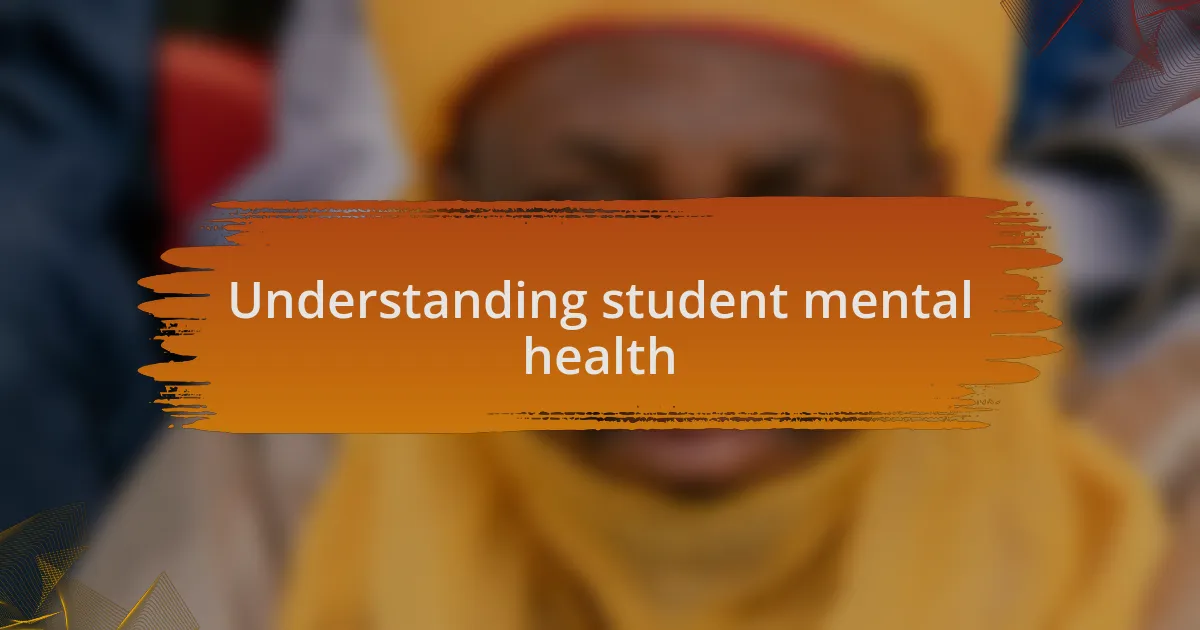
Understanding student mental health
Understanding student mental health requires a nuanced perspective. In my experience, many students face immense pressure from academics, relationships, and future career aspirations, which can lead to feelings of anxiety and depression. Reflecting on my own college days, I remember nights spent worrying about grades—did I really understand the material, or was I just getting by?
I often found myself asking, “Am I alone in feeling this way?” It turns out, this feeling is common among students. Research shows that one in five students struggles with mental health issues, yet many hesitate to seek help due to stigma or lack of awareness about available resources. This made me realize that understanding and addressing mental health isn’t just about recognizing symptoms; it’s also about fostering an environment where students feel safe to express their struggles.
Additionally, I’ve seen firsthand how cultural factors can influence mental health perceptions. Some students may come from backgrounds where discussing mental health is taboo, making it harder for them to reach out for support. It’s crucial to consider these cultural dimensions and promote understanding that mental wellness is vital for academic success and overall well-being. How do we create a community where students feel empowered to share, connect, and support each other? That’s a question worth exploring deeply.
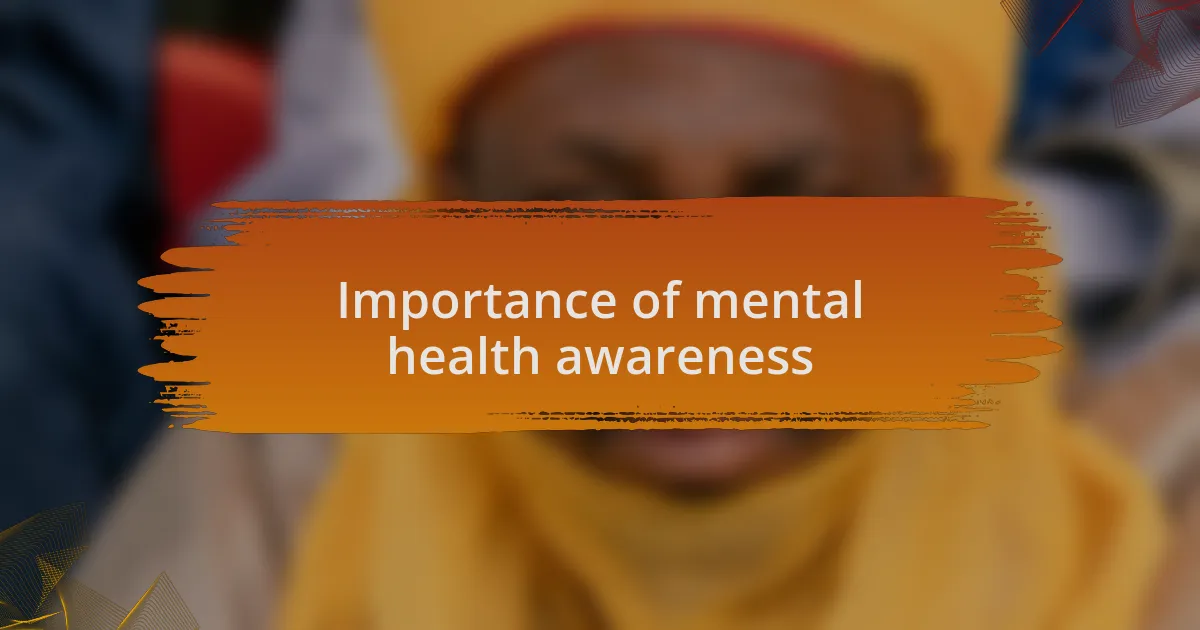
Importance of mental health awareness
Recognizing the importance of mental health awareness is essential for creating a supportive educational environment. I vividly recall a peer who seemed to excel academically but struggled silently with overwhelming stress. If only they had felt comfortable sharing their feelings, perhaps the burden wouldn’t have felt so isolating. Awareness not only helps in reducing stigma but can also foster communities where students feel they belong and can seek help.
Moreover, understanding mental health empowers students to recognize their own needs. I remember attending a workshop on stress management where I learned to identify my triggers. The realization that I wasn’t alone in my struggles brought relief. When students become aware of mental health issues and their impacts, they’re more likely to engage in proactive behaviors that improve their well-being.
Awareness also plays a crucial role in combating misconceptions. I once met a student who believed that asking for help signified weakness. This perspective is all too common, yet it’s entirely misguided. By educating ourselves and others about mental health, we dismantle these harmful beliefs, paving the way for a more compassionate and understanding campus culture.
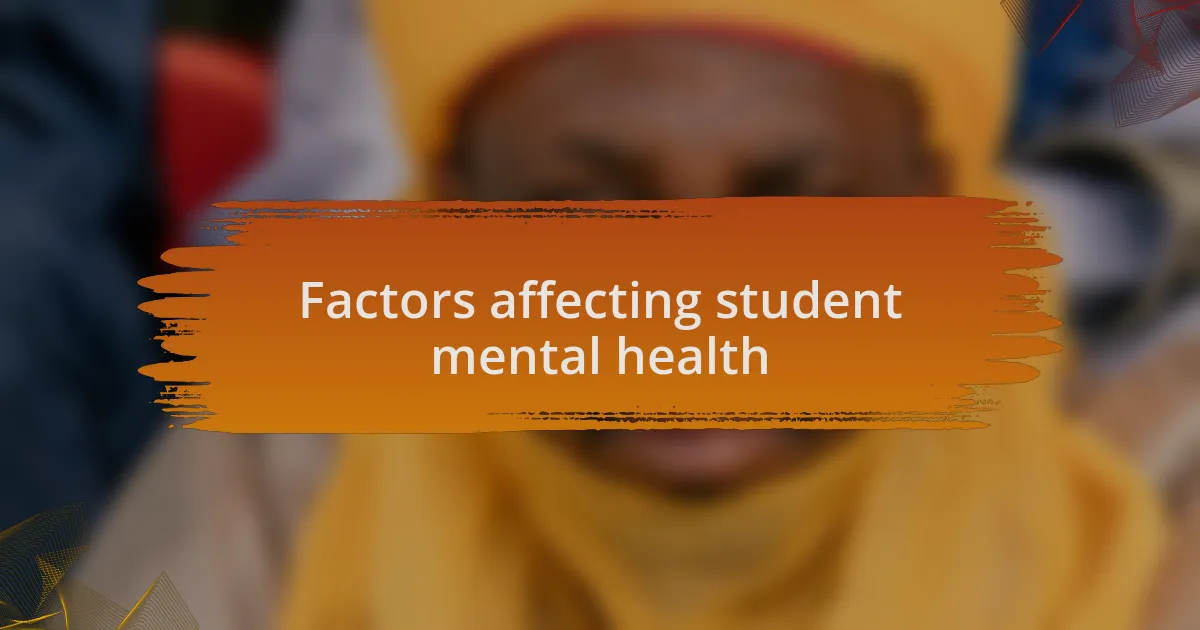
Factors affecting student mental health
One significant factor affecting student mental health is academic pressure. I recall during my college years how the relentless pursuit of high grades often left me feeling anxious and overwhelmed. It’s curious, isn’t it? We often equate academic success with self-worth, leading students to prioritize grades over their mental well-being. This constant stress can lead to feelings of inadequacy and burnout, ultimately affecting their overall mental health.
Another factor is the social environment. I’ve seen how students can feel isolated, especially when transitioning to a new school. I remember my first semester at a university; I felt lost among so many unfamiliar faces. It made me wonder—how many other students are grappling with similar feelings of loneliness, silently longing for connection? Building a supportive network is vital, as social support can significantly alleviate feelings of anxiety and depression.
Lastly, financial stressors can weigh heavily on students’ minds. I remember how worrying about tuition fees and living expenses often clouded my focus in class. It raises an essential question: How can students be expected to thrive academically when they’re grappling with such pressing financial concerns? Addressing these financial burdens through support systems or scholarships can play a pivotal role in improving students’ mental health and overall academic performance.
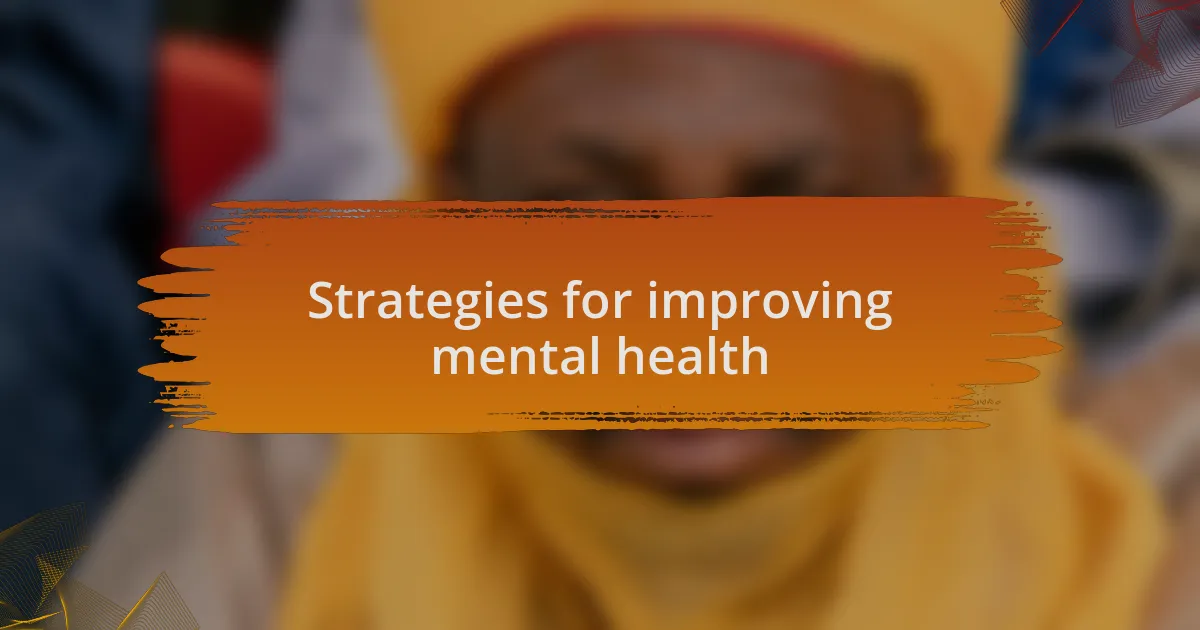
Strategies for improving mental health
One effective strategy for improving student mental health is the implementation of mindfulness practices. I remember the first time I tried meditation during a particularly stressful exam season; it felt like a breath of fresh air amidst the chaos. Have you ever noticed how just a few minutes of focused breathing can shift your entire perspective? Encouraging students to adopt mindfulness can help them manage anxiety and improve their overall emotional resilience.
Creating a culture of open communication is equally important. In my experience, sharing experiences with peers often fosters a sense of belonging and understanding. Have you ever felt lighter after opening up about your struggles? By providing safe spaces for discussions about mental health, educational institutions can empower students to express their feelings without fear of judgment, enhancing their emotional well-being.
Lastly, promoting balanced lifestyles through physical activity can have a profound impact. I often found that a brisk walk or a quick workout was more effective at alleviating stress than hours spent studying. Isn’t it interesting how our bodies and minds are so interconnected? Encouraging students to engage in regular physical activity not only boosts their mood but also supports cognitive function and helps to combat feelings of anxiety and depression.
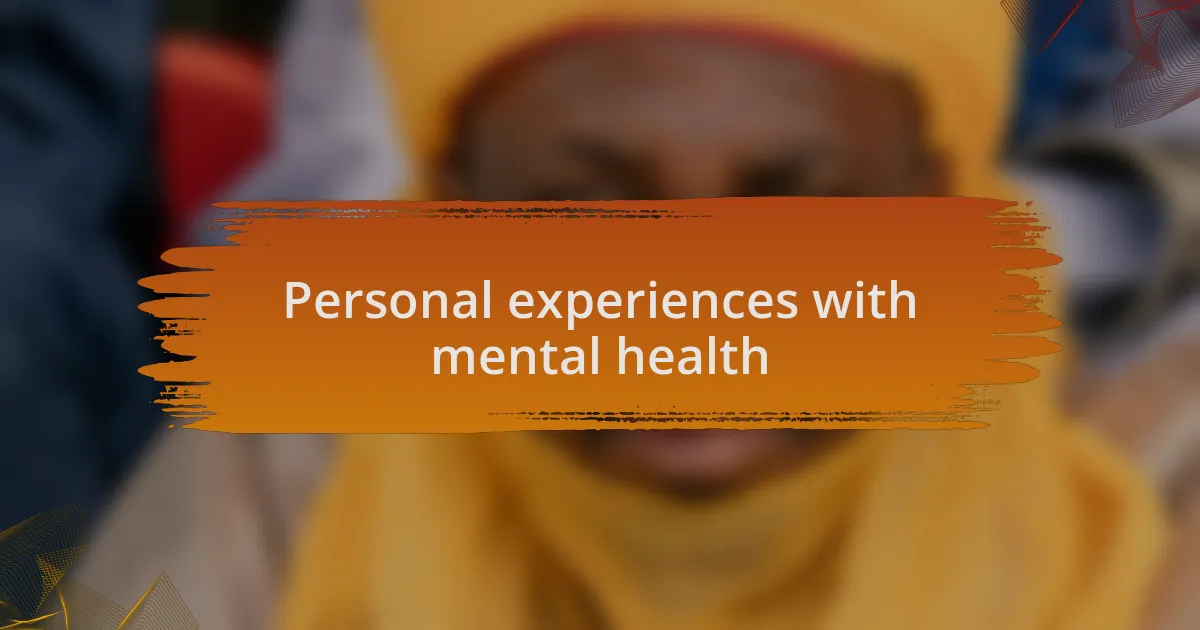
Personal experiences with mental health
Mental health has been a journey for me, one marked by moments of confusion and clarity. I remember a particularly overwhelming time in college when I was juggling coursework and personal issues. During that time, I decided to reach out for help. Have you ever felt like simply talking to someone lifted a weight off your shoulders? That conversation changed my perspective, reminding me that I wasn’t alone in my struggles.
There was a time when I thought that I had to shoulder everything by myself. I often hid my feelings, thinking it would seem weak if I expressed my vulnerabilities. It’s funny how pride can make you overlook invaluable support. When I finally opened up to a friend about my anxiety, the relief was instantaneous. I realized that sharing our experiences can forge deeper connections and foster mutual support. Have you felt the power of vulnerability in your own relationships?
Reflecting on my experiences, I’ve come to appreciate how pivotal those challenging moments were for my growth. I remember standing on the precipice of despair and realizing that asking for help was a form of strength. This insight has fueled my passion for advocating mental health awareness among students. Isn’t it essential for us to share our stories so others know they can find hope, too?